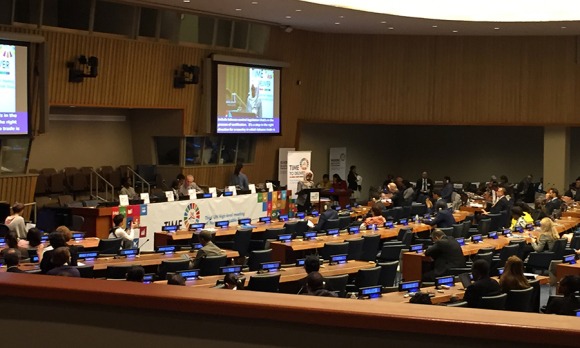The Big Takeway from #UNGA73: Enough Inaction
Noncommunicable Diseases got the spotlight at the UN General Assembly last Thursday, scoring a High-level Meeting that gave world leaders a chance to talk about their challenges and progress tackling diseases from cancer, to heart disease, to diabetes.
Global health heavy hitters took the floor, including WHO Director-General Tedros Adhanom Ghebreyesus, President of Uruguay Tabaré Vázquez—co-chair of the WHO Independent High-level Commission on NCDs—and Princess Dina Mired of Jordan, President Elect of the Union for International Cancer Control. But the day also aimed to give voice to small countries and civil society groups, too, with a parade of statements that ran the entire afternoon citing success stories, stubborn obstacles, and ambitious goals. By the end of the day, leaders passed a resolution committing to implement a series of WHO-recommended policies to prevent and control of NCDs.
As in the HLM focused on tuberculosis, funding and political will are key with NCDs. Sania Nishtar made a pitch for investment in technology and research as the best hope to head off NCDs—and emphasized that the funding must be sustainable for long-term solutions: "Although catalytic funding is needed the mainstay has to be domestic public financing," she said.
But regardless of funding, countries can take action; that's a message Michael R. Bloomberg—newly reappointed to his second term as WHO’s Global Ambassador for Noncommunicable Diseases—emphasized in his keynote address highlighting success stories and strategies. “For the most part these policies don’t require a lot of money. What they do require is political will.” He pointed to 3 countries that have made a huge difference already:
- India reduced tobacco use by 17% since 2010.
- In Bangladesh adult tobacco use fell by over 18% since 2009.
- Uruguay beat a tobacco industry lawsuit, challenging the country's law requiring health warnings on cigarette packs.
Nestled among the country statements, civil society advocates had a chance to take the floor as well—and some of the most passionate comments came from youth. Representing the Young Professional Chronic Disease Network, Jordan Jarvis said, “We believe that NCDs are the social justice issue of our generation ... But let us be clear, when it comes to achieving our goals on both NCD prevention and treatment, competing private interests are too often pitted against our survival and well-being." She concluded with a call to shift the discussion toward win-wins with the private sector: "We demand that in all rhetoric and actions, people win first, and industry wins second. Shouldn’t the outcome of economic development be to improve well-being for the majority?"

Closing statements from UNGA's HLM on noncommunicable diseases. Dayna Kerecman Myers
In a closing statement, Portuguese Minister of Health Adalberto Campos Fernandes said, “It is not hard to understand that the business of sickness is much more profitable than the business of health. And unfortunately, often, economic interests oppose health.” He urged global leaders to focus on overcoming poverty, calling it the biggest social determinant for disease.
The closing statements and resolution didn't mark the end of the push, though ... sideline events continued through the week. At a sideline event Friday, the WHO launched SAFER: A roadmap to prevent and reduce alcohol-related deaths and disability in support of the global target of reducing harmful use of alcohol by 10% by 2025, from strengthening restrictions to raising alcohol prices. The tactics include:
Strengthen restrictions on alcohol availability
Advance and enforce drink driving counter measures
Facilitate access to screening, brief interventions and treatment
Enforce bans or comprehensive restrictions on alcohol advertising
Raise prices on alcohol through excise taxes and pricing policies.
Also on the heels of the meeting, the WHO kicked off a global initiative to treat children with cancer, aiming to double the cure rate to achieve at least a 60% survival rate by 2030—saving an additional 1 million lives.
Correction: Please note that the statement by Jordan Jarvis of the Young Professional Chronic Disease Network has been updated to include her name and full statement regarding win-wins and the private sector, clarifying that industry wins second, not economic development.
More from #UNGA73:
Read about UNGA's HLM on Tuberculosis here: High-level Hopes to End TB
Join the tens of thousands of subscribers who rely on Global Health NOW summaries and exclusive articles for the latest public health news. Sign up for our free weekday enewsletter, and please share the link with friends and colleagues: http://www.globalhealthnow.org/subscribe.html
Croatia's gift to the UN, in the UN HQ sculpture garden. Image: Dayna Kerecman Myers





